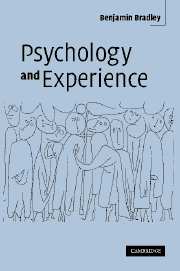Book contents
- Frontmatter
- Contents
- List of illustrations
- Preface
- Acknowledgements
- 1 Introduction
- 2 Learning from experience
- 3 From here to synchrony
- 4 What to make of coincidence
- 5 The topography of intersubjective space
- 6 The two axes of psychological explanation
- 7 Pictures of psychical change
- 8 Research among equals
- 9 Validating the curriculum
- 10 Conclusion
- List of references
- Index
2 - Learning from experience
Published online by Cambridge University Press: 22 September 2009
- Frontmatter
- Contents
- List of illustrations
- Preface
- Acknowledgements
- 1 Introduction
- 2 Learning from experience
- 3 From here to synchrony
- 4 What to make of coincidence
- 5 The topography of intersubjective space
- 6 The two axes of psychological explanation
- 7 Pictures of psychical change
- 8 Research among equals
- 9 Validating the curriculum
- 10 Conclusion
- List of references
- Index
Summary
An ounce of experience is better than a ton of theory simply because it is only in experience that any theory has vital and verifiable significance.
(John Dewey, 1966a, Democracy and Education, p. 144)Learning from experience sounds circular. What is there to learn from if not experience? Thin air? Even book-learning relies on one's having read, that is ‘experienced’, the book. Learning about something by reading a book however, particularly a textbook, or listening to a lecture or scanning the web, is liable to yield a far skimpier sort of understanding than living that thing at first hand. You may know a lot of facts about suicide or about war, but unless you or someone dear to you has fought in a war or been in life-threatening despair, your knowledge is going to miss out on a whole dimension available to those who have ‘been there, done that’. And that dimension is peculiarly central to the discipline of psychology. For experience, life as it is made up of events lived at first hand, is the stock in trade of psychology. It is what first attracts us to the discipline. And the kinds of problem psychologists' work confronts them with are problems that have to do with the ways people experience their worlds. Psychological problems are problems because they make living difficult. Experience must hence be the ultimate proving-ground for the fruitfulness of all our conjectures.
- Type
- Chapter
- Information
- Psychology and Experience , pp. 17 - 45Publisher: Cambridge University PressPrint publication year: 2005



